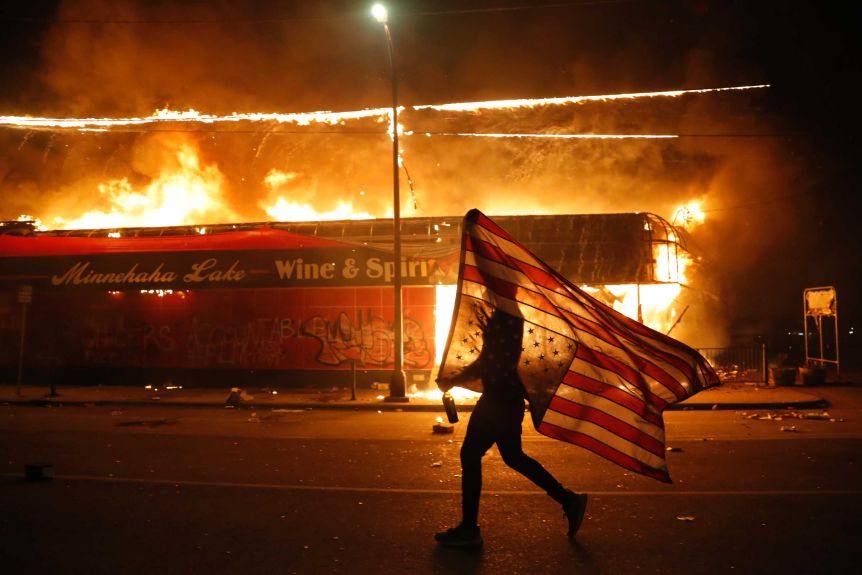George Floyd protests: This summer will change the US — hopefully for the better
https://arab.news/ynxwb

The US is in crisis. Like the rest of the world, Americans have experienced the spread of the coronavirus disease (COVID-19) and the subsequent economic crisis within a few short months. In the US, this was layered on top of years of increasing political and social polarization and unequal economic growth. Long simmering emotions are now spilling over on the streets of American cities.
On May 25, a police officer in Minneapolis, Minnesota, put his knee on the neck of George Floyd, who was cuffed and lying on the ground. He kept his knee on Floyd’s neck for more than eight minutes, despite Floyd saying he could not breathe and bystanders asking him to stop, while three other officers stood by and even after Floyd lost consciousness. Floyd died. The video recording of the incident went viral, briefly leading to some unity among Americans, as many Democrats and Republicans, and black and white Americans, condemned the murder. The primary officer involved has now been charged with second degree murder, while the three others face counts of aiding and abetting murder.
Protests quickly erupted over Floyd’s death and did not end when the main officer involved was arrested. Extended protests were hardly surprising because Floyd’s death was not a one-off incident — it was the latest in a very long history of violence against black Americans and in a notable string of attacks on black men in the last few years.
The US has a long history of racial inequality and violence against black Americans. It began with slavery, an institution of extreme violence that was deeply integrated into the economy and culture of the American South. The American Civil War, from 1861 to 1865, ended slavery. After a few years of reforms to give former slaves more rights, that effort was rolled back and black Americans in the South experienced decades of institutionalized violence and Jim Crow laws. Beyond the South, which many fled in the Great Migration, they also experienced discrimination and segregation. This led to the civil rights movement and eventually a major expansion of legal rights through several laws passed in the 1960s.
The civil rights successes improved life and opportunities for many black Americans, but significant economic, social and health inequalities remained. Notably, the pandemic has hit black communities disproportionately, reflecting broader health disparities.
Black Americans also face a higher risk of police violence. Recent years have included multiple controversial cases of black Americans dying in encounters with the police, including Breonna Taylor in March in Kentucky, Philando Castile in Minnesota in 2016 (his death was livestreamed by his girlfriend), Freddie Gray in Maryland in 2015, Michael Brown in Missouri in 2014, and Eric Garner in New York in 2014. There also have been high-profile cases of armed white civilians murdering black Americans they perceived to be criminals, including Ahmaud Arbery in February this year and Trayvon Martin in 2012. These are only a few examples. Meanwhile, the proliferation of smartphones has led to far more evidence of these incidents, making it difficult for other Americans to blame the black victim or to see such cases as rare occurrences.
There have been widespread protests and sometimes riots over these cases in the past, including several of the cases listed above and the famous Los Angeles riots of 1992 that occurred after the beating of Rodney King — an early case of police violence caught on camera. Much of what is driving today’s anger and hopelessness is that there seems to be little accountability or change.
Anger, frustration and pain are now widespread in the country. Across racial and economic divides, the pandemic and its related economic crisis have caused widespread suffering. While minorities and lower-income groups have been particularly hard hit, many white Americans are also suffering and angry, though they are more ideologically and politically divided. Floyd’s death lit a match that set ablaze anger over the pandemic and the 2020 economic crisis, as well as years of unequal post-recession recovery, growing rural-urban divides, political polarization, and many other socioeconomic challenges. It also appears that some extremists may be taking advantage of the situation to escalate violence.
Much of what is driving today’s anger and hopelessness is that there seems to be little accountability or change.
Kerry Boyd Anderson
A lack of trust in government authorities and the media is exacerbating the problem. Political polarization has divided Americans, and many now believe only their own partisan group’s media and leaders. This has complicated the response to COVID-19, as there is no single authority that most Americans trust to deliver messages on the pandemic or the economy. Similarly, there is no single authority that most Americans trust to help heal the country’s divisions around racial inequality and violence. As Americans prepare to vote in November, there also is a lack of trust around the security and fairness of the elections.
The summer of 2020 will change the US. Hopefully, it will lead to gradual healing, recovery, and reform. However, rebuilding trust and closing divides will require dedication and work, and it is easier to fuel division and outrage. There are some positive signs, including examples of police kneeling to demonstrate sympathy with protesters, and demonstrators who have insisted on nonviolent actions. Perhaps such examples can provide a starting point.
- Kerry Boyd Anderson is a writer and political risk consultant with more than 16 years’ experience as a professional analyst of international security issues and Middle East political and business risk. Her previous positions include deputy director for advisory with Oxford Analytica and managing editor of Arms Control Today. Twitter: @KBAresearch










































